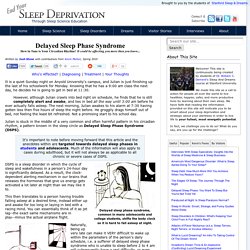

How does a guy with ADHD sleep? Zeo Personal Sleep Coach. Zeology — The Art + Science of Sleep. Delayed Sleep Phase Syndrome - What It Is And How To Treat It. Written by Josh Stone with contributions from Kevin Morton, Spring 2010 It is a quiet Sunday night on Anyold University's campus, and Julian is just finishing up the last of his schoolwork for Monday.

Knowing that he has a 9:00 am class the next day, he decides he is going to get in bed at 11:30. However, although Julian crawls into bed right on schedule, he finds that he is still completely alert and awake, and lies in bed all the way until 3:00 am before he ever actually falls asleep. The next morning, Julian awakes to his alarm at 7:30 having gotten less then five hours of sleep the night before. He groggily drags himself out of bed, not feeling the least bit refreshed.
F.lux: software to make your life better. Customer Reviews: Philips goLITE BLU Light Therapy Device. How to Fall Asleep Fast and Easily. Sleep—Information about Sleep. Figure 1.

Problem sleepiness can have serious consequences. 1 Introduction.